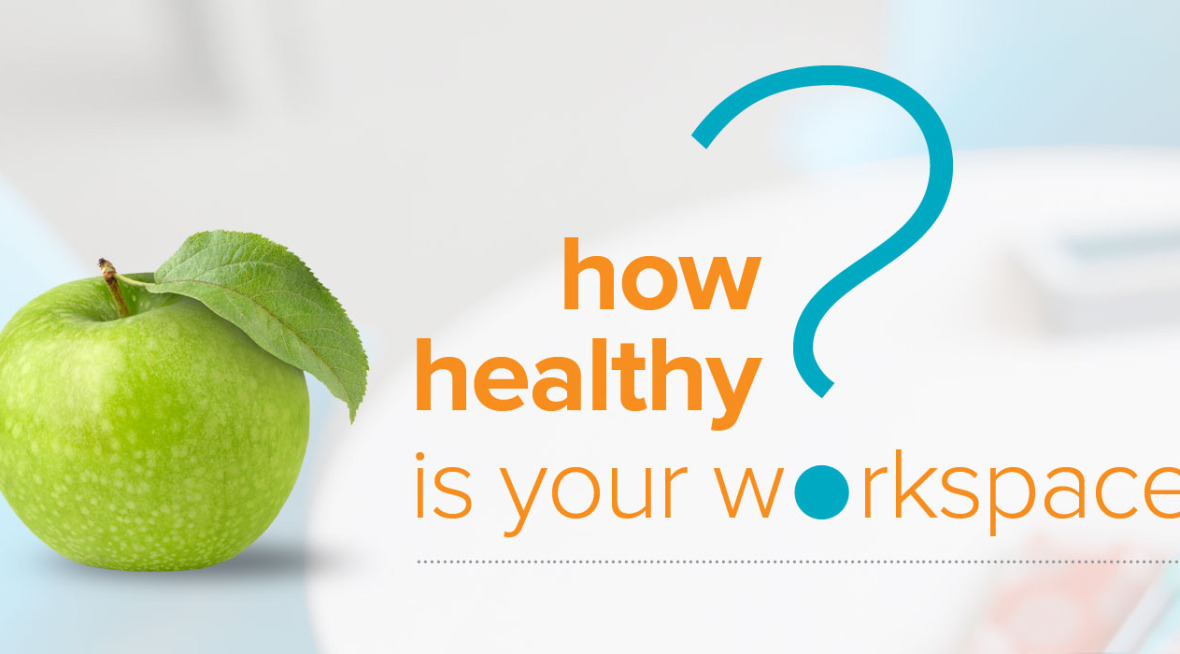
If you think about the number of hours you spend sitting at your desk and in your office area, it's extremely important to make sure your workplace is a healthy, welcoming environment.
Here are some of the more common unhealthy factors in workplaces across the country—and several tips to help you improve the health of your workplace!
learn how management can model wellbeing at work
Germs and Bacteria:
I'll start with the obvious — germs and bacteria!
Even if you have your very own workplace, your own computer, your own office phone, cell phone, tablet and pens, you will still come into contact with millions of germs and bacteria every single day. It might not always make you sick, but it's still a huge factor in determining how healthy your workplace is.
According to this article from the Steelcase 360 Magazine: "'Desktops are among the worst germ traps,' says University of Arizona germ guru Dr. Charles Gerba. According to his research, office workers’ hands come in contact with 10 million bacteria a day. Crumbs that accumulate on desks are a perfect environment for bacteria and fungi to thrive…"
Yuck!
So what can you do about it?
Wash your hands regularly, use hand sanitizer frequently, don't eat at your desk, don't come into work when you're sick, wipe down your electronics, your phone, your keyboard, your desktop and all other surfaces you touch on a regular basis. If you share a workplace, encourage your office partner to get on-board with your cleaning routine.
For more office germ-fighting strategies and ideas, checkout this helpful article.
Dirt, Dust, and Grime:
Dirt, dust, and grime might not seem as gross as germs and bacteria, but they can really create an unhealthy working environment if you don't get them under control. Dirt and dust mites can cause respiratory issues and allergy flare-ups depending on the severity of the issue.
What can you do about it?
Take care to regularly wipe down the various flat surfaces in your office space. Remove items like curtains, rugs, pillows, or other fabric items that can quickly collect dust. Keep your workplace uncluttered (see below). You might also consider a personal air purifier for your space.
Clutter:
A few stacks of paper, a messy junk drawer, an over-crowded email inbox might not seem like huge issues in comparison to 10 million bacteria, but too much clutter will decrease your productivity and can potentially lead to more stress and less satisfaction at work.
What can you do about it?
Spend a few minutes every day decluttering up your workplace, filing papers, weeding through emails, cleaning up your computer files and purging outdated technology. A little extra effort paired with continual maintenance will keep your clutter at bay and your workplace healthier and happier.
7 ways to boost productivity in the office
Noise Control:
We all have different sensitivities to noise, just as we probably all have a different definition of what "noise" actually is.
However, I think it's safe to say that noise can be a huge distraction and annoyance in the workplace, especially if you're not the type of person who can focus with lots of extra noise around you.
Whether it's music coming from other workstations, the hum of your air conditioner, squeaky doors and chairs or other people's conversations, all of these noises affect the healthiness of your workplace.
According to this article from the Steelcase 360 magazine: "The noise level of 60-65 decibels that’s common in some open-plan offices is not only too loud for concentration, it can also impede effective collaboration by causing speech interference."
So what can you do about it?
Wear earplugs, close your door (if applicable) or bring an inexpensive white noise machine to cancel out some of the other noises. Ask if you can work remotely, and if so, head to your favorite quiet spot.
Also, remember to do your part to keep the office quiet. Wear ear buds, talk quietly when on the phone, try not to have conversations near other people's workplaces.
Ergonomics:
Is your chair comfortable? Is your desk at the proper height? Is your computer screen the correct distance from your eyes? All of these things should be considered if you're serious about improving the health of your workplace.
I'm not an ergonomics expert, but I do know that proper ergonomics is critical to your health and productivity. Here's a great article about how proper posture can create a healthier working environment.
What can you do about it?
Do a little research on how your chair, desk and computer should be positioned. Pay attention to how comfortable you feel sitting at your workplace and whether you're sore after sitting for long periods at your desk. And don't forget to practice the 20-20-20 rule!
These are just a few ways you can drastically improve the health of your workplace. By paying attention to these workplace components, you should begin to see improvement in your overall wellbeing, leading to a more enjoyable work experience!
